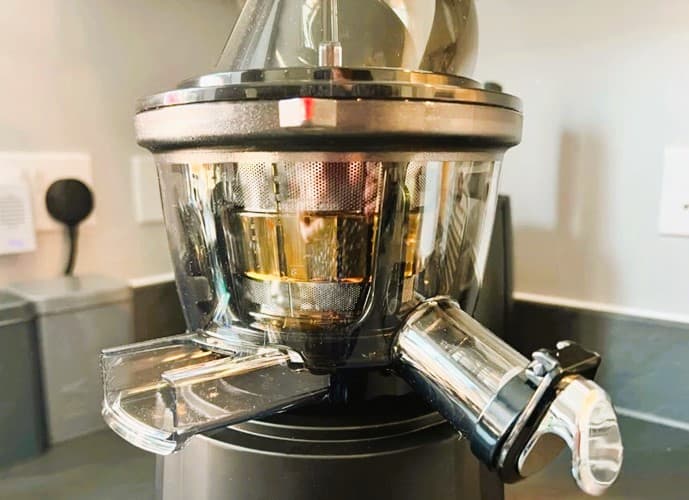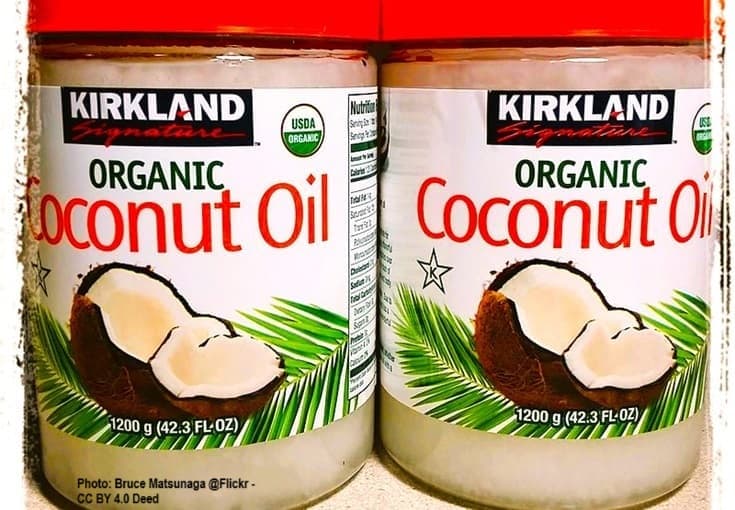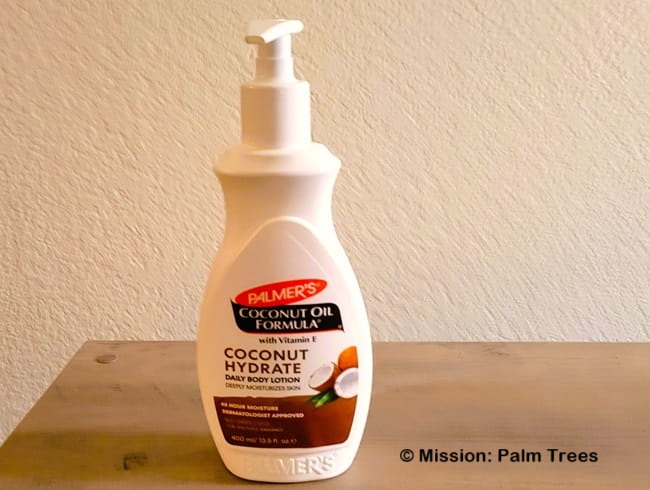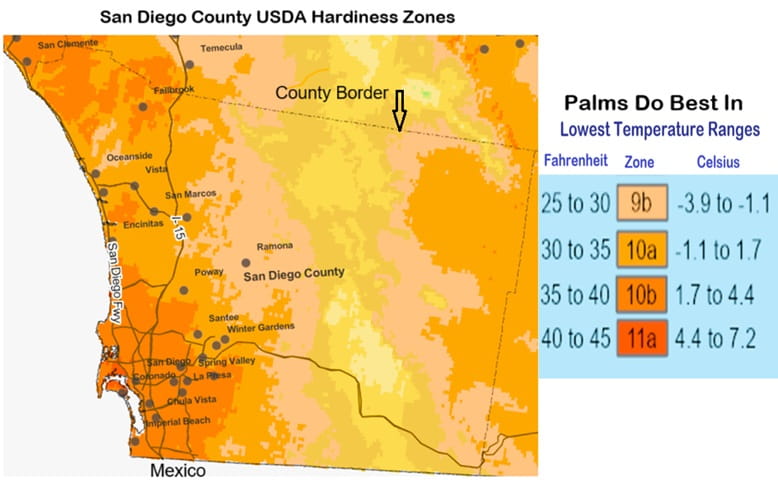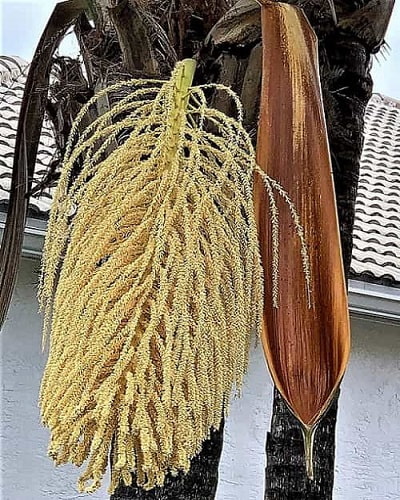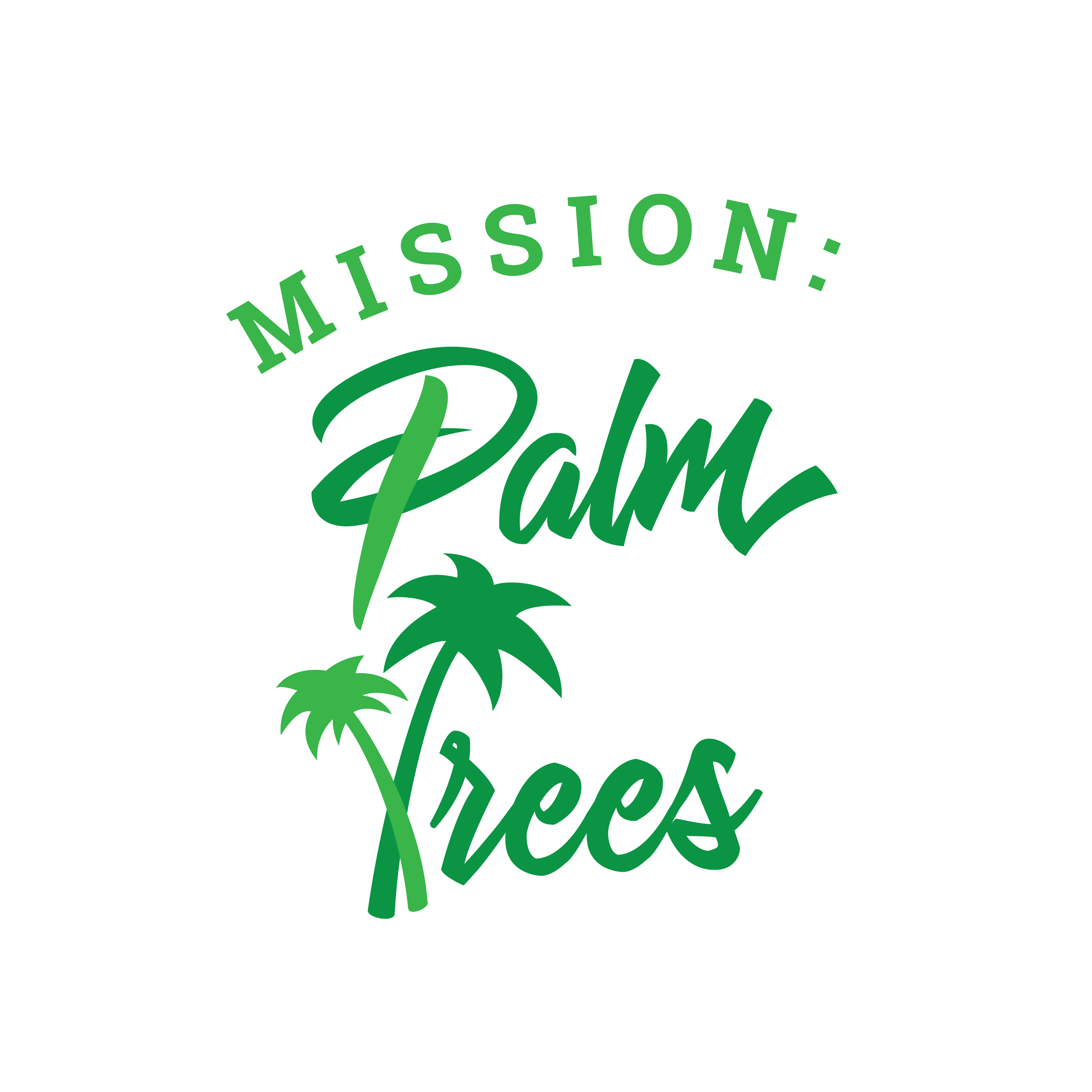- Home
- Fruit of Palms
- How Coconuts Grow
- Cocos Benefits/Uses
Coconut Tree Uses and Benefits
Many ask what Coconut Tree uses and benefits are there?
All parts of the coconut tree are useful. That's why people sometimes call it by its nickname: the "Tree of Life."
The coconut tree is a palm that grows in tropical climates. The coconut palm scientific name is Cocos nucifera. From coconut roots to coconut leaves, every part of the coconut palm tree has a purpose.
Let's find out what they are!
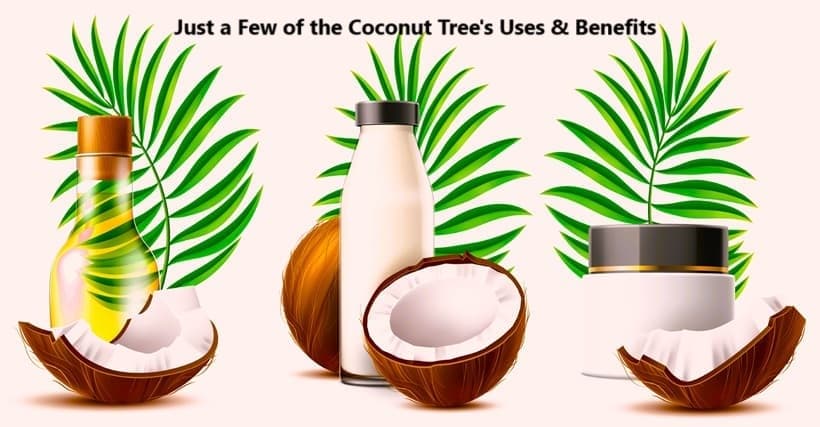
At Mission: Palm Trees
Palm lovers can soothe their palm-related searches and concerns. Our articles are intended to inform, while having fun, easily Finding What You Want or Need. Without unneeded shoptalk & tiring endless research. We Research For You!
Food and Beverage Uses of the Coconut Tree
The coconut palm gifts us ingredients to use in cooking, snacking and refreshing drinks.
What Drinks are Made From the Coconut Palm?
The Coconut Tree provides several drinks. Coconut water is readily available from the fruit. Coconut milk combines a few coconut fruit parts.
Is Coconut Water Good for You?
The fruit's water gives us plenty of helpful coconut tree uses and benefits!
Young green coconuts have liquid that provides you potential health benefits.
- Some say it has a high electrolyte content.
- Yet the potassium, phosphorus, sodium & manganese content will vary. Depending on the coconut's age.
- It adds helpful hydration to your body after exercise, or an illness.
FTC Disclosure: If you purchase via a link/ ad on this site, we may earn a small royalty. There's no added cost to you. Thanks much for any looks/ orders! Details>
For instance, My Hubby had some heart issues relating to electrolyte levels out of whack. He now incorporates coconut water into his diet. He used and Recommends This Brand.
Yet it isn't any more hydrating than plain water.
- Drinking Water has zero calories.
- Eight ounces (237ml) of coconut water has about 55 calories. More or less, depending on if it's directly from the coconut fruit or from Grocery Stores.
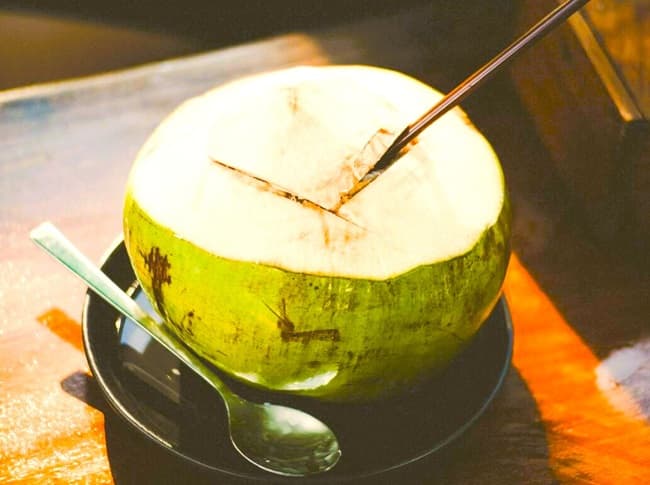 Fresh Coconut Meat, With Straw for Drinking its Water.
Fresh Coconut Meat, With Straw for Drinking its Water.Is Coconut Milk Healthiest?
Coconut milk is a made product, starting with the raw meat of mature coconuts.
Coconut Milk is delicious, so it's used in food products. For instance in ice cream. We've tried Coconut Milk Ice Cream and loved it. Very creamy!
Is drinking coconut milk good for you?
- The high fat amount in coconut milk isn't the good kind. About 90% is saturated, which could raise cholesterol levels.
- There are limited, conflicting studies of health benefits from coconut milk.
- So the American Heart Association doesn't recommend it. They don't verify it helping with cardiovascular disease.
One study does show it may benefit blood pressure levels. Other potential health benefits are the phenolic compounds in coconut milk, which obstruct harmful free radicals.
Coconut milk's protein content is negligible. While cow's milk has 8g.
Yet if you're dairy intolerant, it's one of the options. Besides almond, soy, rice or oat milk.
There are several ways you can make coconut milk. This demonstration below is a pretty good choice. Remember, homemade Coconut Milk Doesn't Have a Long Shelf Life.
How to make coconut milk
- You can peel off the brown skin on the Coconut Flesh for a milkier appearance. It tastes the same either way.
- Easily get the coconut meat out! By cutting coconut shells in half. Then bake the halves for 20 minutes in an oven at 325°F/170°C.
How Do You Open a Coconut to Get the Water Out?
The easiest way to get coconut water out:
- Drill out holes in the coconut. Make them as wide as you can. You can use A Pointy Knife, Screwdriver or an Awl. Coconut eyes are good for this, as they're softer.
- Turn the coconut upside down and place on a Wide Measuring Cup, or Small/Narrow Bowl.
- One of the holes allows air in, while water drains out the others.
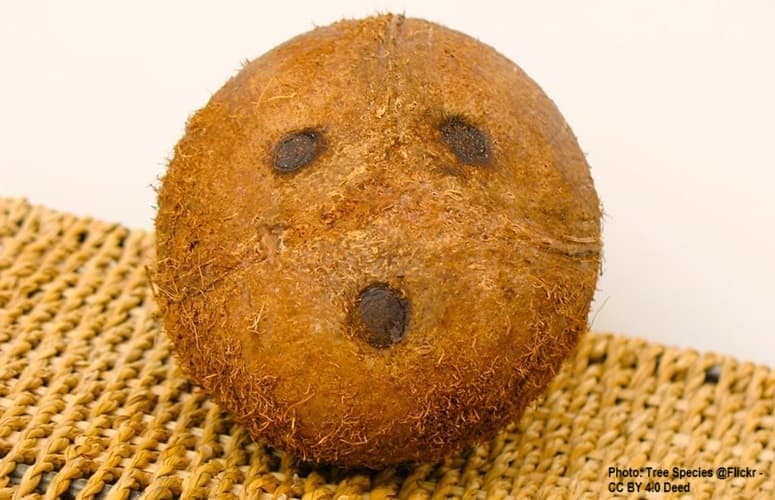 The Eyes are the best way to get to Coconut Water.
The Eyes are the best way to get to Coconut Water.Coconut Cream Uses
Use Dairy-Free Coconut Cream in coffee, sauces, hot chocolate, custards, curries and in/on cakes & pies.
- Instead of whipped cream from cow's milk
- Instead of frozen whip made from vegetable oil & high fructose corn syrup.
We know of two ways to make homemade coconut cream.
A Creamy Delight!
- Pour coconut milk into a wide mouth jar.
- In the refrigerator, let it settle overnight. The heavier liquid sinks, and coconut cream rises to the top.
- Wait about 24 hours for the separation process to finish. Then spoon out the cream at the top.
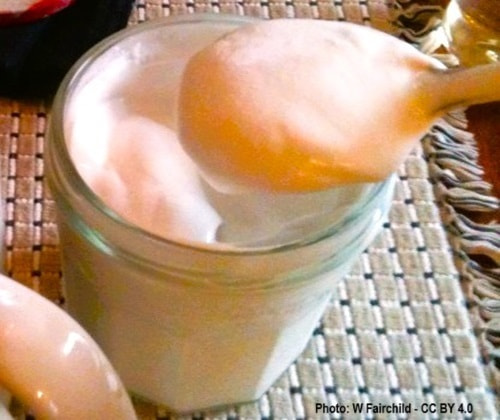 How About Some Coconut Cream in Your Coffee?
How About Some Coconut Cream in Your Coffee?Make Coconut Cream With a Juicer
- Place strips of coconut meat into the Double Chute Juicer.
- Run it for automatic separation: shredded coconut from one spout & cream from the other!
More Coconut Palm Tree Food & Beverages
Straight coconut water & coconut milk aren't all the edibles from the fruit of the coconut palm. More are:
- Inner coconut trunk is pickled for a treat. Also added to bread dough & soup.
- Stems of coconut flowers (inflorescences) are cooked up as a vegetable serving.
- Fermented sap is a Potent Potable!
- Coconut water thickens, turns gummy halfway to ripening. Considered gourmet food, raw or cooked.
Let coconut products elevate your creative cooking!
Here are even more:
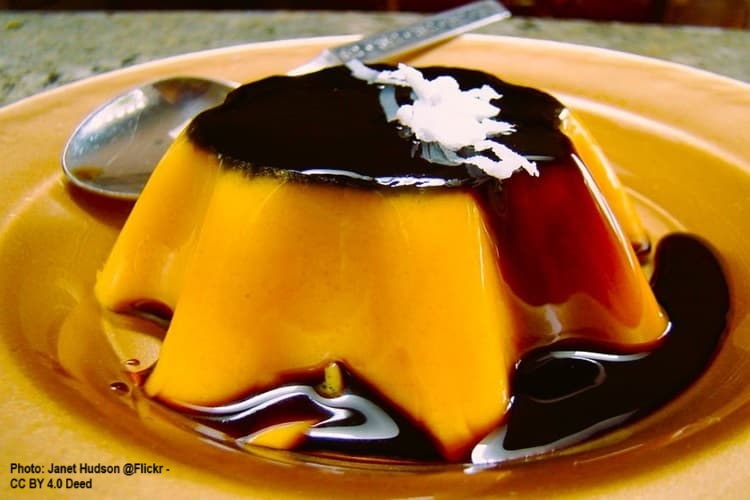 Coconut Flan! Wow, making our mouths water. 😋
Coconut Flan! Wow, making our mouths water. 😋Click to Easily Try the Puerto Rican Style
Meat of the Coconut - Uses, Effects & More
The raw meat of the coconut is delicious! And also packed with nutrition.
- A good source of dietary fiber (9g)
- Some vitamin C (3.3mg) & many minerals.
- Plus some beneficial fatty acids.
If you make coconut milk, Shredded Coconut is the leftover product, when dried.
- It can be used as is for baking, topping deserts & more.
- It can be ground up to make Coconut Flour. Which is gluten free.
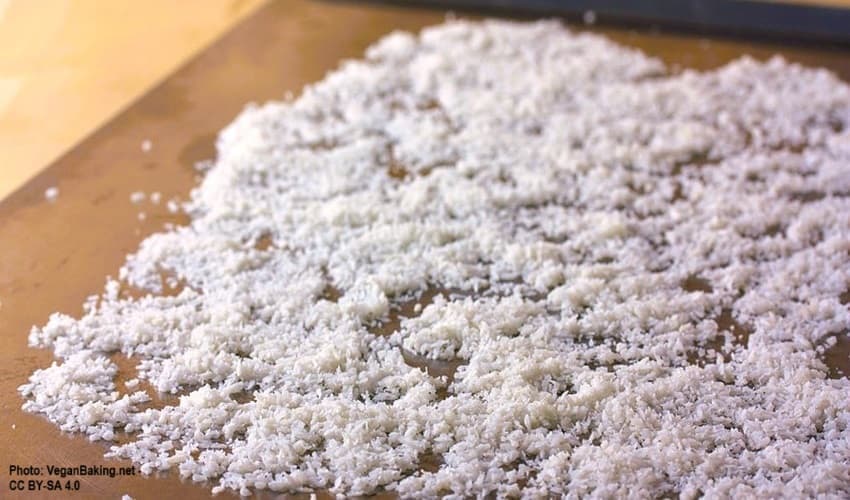 We think fresh coconut is the best. Do you agree?
We think fresh coconut is the best. Do you agree?What is the Coconut Copra Oil Used For
The dried kernel (coconut meat) is the source of copra, Virgin Coconut Oil.
Commercially processed to form this oil. It's squooshy-solid when finished.
It has tons of uses in cooking, skincare, and even healthcare. A $5-billion yearly market!
What are Coconut Oil benefits?
Coconut oil is said to have potential health benefits. Because of the unique structure of fatty acids.
- Some say it lowers the bad cholesterol: LDL.
- Some say it aids weight loss.
- Many say it improves skin & hair.
NOTE that a peer-reviewed study was completed in 2022. Using multiple already published studies to see their outcomes related to heart health. The conclusion of the report was that any blend of the coconut oil's "...effect on LDL... remain questionable." [see Sekhar, S., et al. in bibliography/references.]
Is Coconut Sugar Healthier Than Sugar
Coconut Sugar is made from coconut palm flower stem (inflorescence) sap.
The coloring is reminiscent of Brown Sugar. It appears to be somewhat better than regular cane sugar.
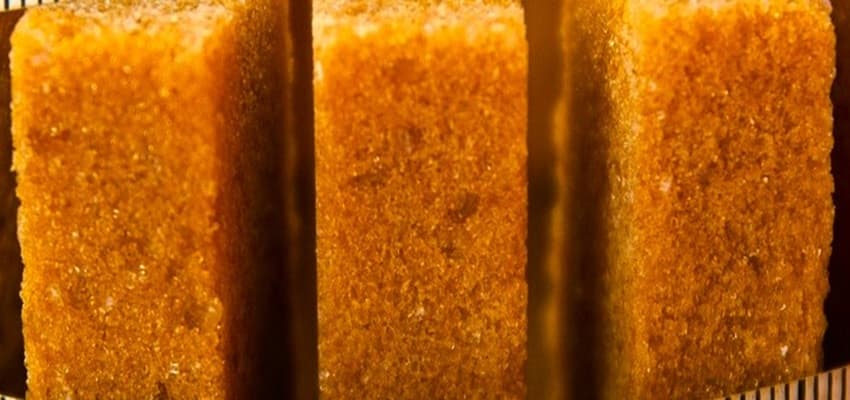 Coconut Sugar Cube Blocks
Coconut Sugar Cube Blocks- The coconut sugar Glycemic Index is a bit lower (6 points less) than table sugar. Meaning it won't spike your blood sugar levels as much.
- It has small percentages of minerals like iron, zinc, and potassium.
- Also antioxidants. Plus dietary fiber which helps gut health.
Common table sugar has no nutrient value. And it does spike your blood sugar upwards. Not a good thing.
Yet remember, there's still no way Coconut Sugar is any kind of healthy food. But if you can choose between that and white cane sugar, it's the better decision.
Healthy Food From Coconut Tree Leaves
Young coconut tree leaves are edible.
- Useful in salads or as a garnish in creative dishes.
- Useful for wrapping meat to retrain moisture when grilling, steaming or baking.
- The coconut palm's heart, the apical bud, is served in various ways.
- That's the Palm Tree Part that grows new fronds.
- Problem Is: Take that Palm Heart away & the Coconut Palm Tree dies.
Coconut Tree Medicinal Uses and Benefits
The roots of the coconut tree have medicinal properties.
They're used in traditional medicine to treat a variety of ailments, from dysentery to skin diseases. Roots are also used to make Coconut Mouthwash.
In some cultures coconut tree uses and benefits include grinding the palm's coconut roots to give you a drink of Caffeine-Free Version of Coffee.
- Alternatively, there is a Caffeinated Coconut Coffee To Try.
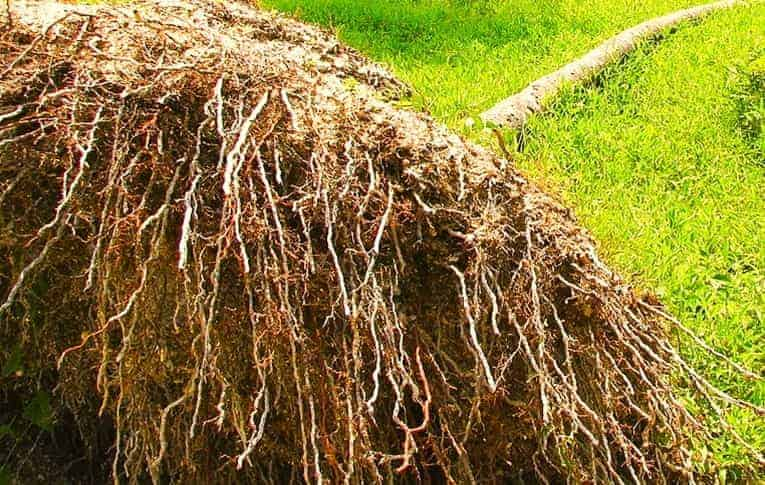
Healthful Uses of Coconut Oil
Additionally, oil is used to promote healing. Plus there are skin benefits.
- A Scientific Study found that coconut oil treats burns and speeds up healing. But only when combined with silver sulphadiazine.
- Because of its humectant properties, Coconut Oil aids dry skin, and helps contain dandruff.
Coconut Tree Uses and Benefits
for Households & Industries
Uses & Benefits for the Outer Coconut Shells
Coconut Husk Fibers are useful. People make Twine Ropes, Mats for Multiple Purposes, Cleaning Brushes, & even Mattress Pads.
Coir is also used as plant potting mixes. Coconut Coir (we have that one & it's quite good!) improves soil aeration and water retention. It's also used for a mulch or in compost.
Coconut Shells Make Charcoal. Or coconuts are made into Kitchen Utensils, Food Bowls, or Decorative Objects.
What are Useful Products of Coconut Palm Leaves?
Coconut tree & palm uses and benefits include the leaves.
- Stems of coconut tree fronds are stiff, yet bendy. Useful for making into Broom Products.
- Fronds are used in Many Tropical Regions Like in Vietnam.
- Find them in roof thatching, Disposable Plates, Palm Leaf Baskets, Kitchen Placemats and other Woven Projects.
 Coconut Palm Thatched Roof
Coconut Palm Thatched RoofCoconut Tree Uses for Handicrafts
Nice crafty items can be made from Parts of the Palm Tree like the halves of Coconut Shells, or Palm Leaf Spears.
Palm fronds especially are used to make Hand-Held Fans, mats, Hearts for Crafting, decorative stars, buckets, baskets and lots more!
LIKE THIS FUN IDEA IS ONE OF THE COCONUT TREE USES AND BENEFITS
 How Cute!! 😁Creative Use for a Coconut Shell, a Hamster's Hide-Out.
How Cute!! 😁Creative Use for a Coconut Shell, a Hamster's Hide-Out.What are the Uses of a Coconut Trunk?
The trunk of the coconut palm tree is often overlooked. But it's one of the important uses of coconut trees.
- Coconut wood is used in building construction.
- Coconut trunk boards make furniture.
- Coconut trunk pulp is used for making paper.
Coconut Palm for Beauty Products' Benefits
Coconut tree uses and benefits are well known by the beauty industry.
They use coconut products in several ways. Among those:
- Look at ingredients in your Haircare Products. You may find Coconut Oil listed.
- Coconut shells and oils are used as Natural Exfoliators in Body Scrubs
Our Latest
-
San Diego palm trees: History, Species, and Their SoCal Charm
Fascinated by San Diego palm trees? Discover their history, types, and why they're a staple of SoCal’s SD neighborhood scenery to inspire your landscape design.
Coconut Tree Uses & Benefits
For Environment and Economies
ENVIRONMENTAL ASSISTANCE
- Coconut husks are made into Coir Mats to help prevent soil erosion & weeds.
- And of course, coconut leaves are the part of a coconut tree that absorbs CO2. In return, oxygen is produced. Their contribution to reduction in greenhouse gases.
- Coconut Shells and husks have been made into sustainable biofuel.
SUPPORTING ECONOMIES
- Countries get a variety of cash flow from Coconut Tree Products. Like the food, textile and cosmetic industries which employ many people.
- Farmers are supported by their coconut palm groves. As an employer for locals, families are helped.
- Coconut trees can even increase property values in some tropical regions.
Coconut Tree Uses and Benefits - The Takeaways
Coconut tree uses and benefits go far beyond the delicious coconut fruit.
Not only does it provide food and drink, but it also offers materials for shelter, utensils, herbal medicine, and more. No wonder it's called the "Tree of Life."
Look the coconut palm from the bottom up! Every part of a coconut tree can be used.
